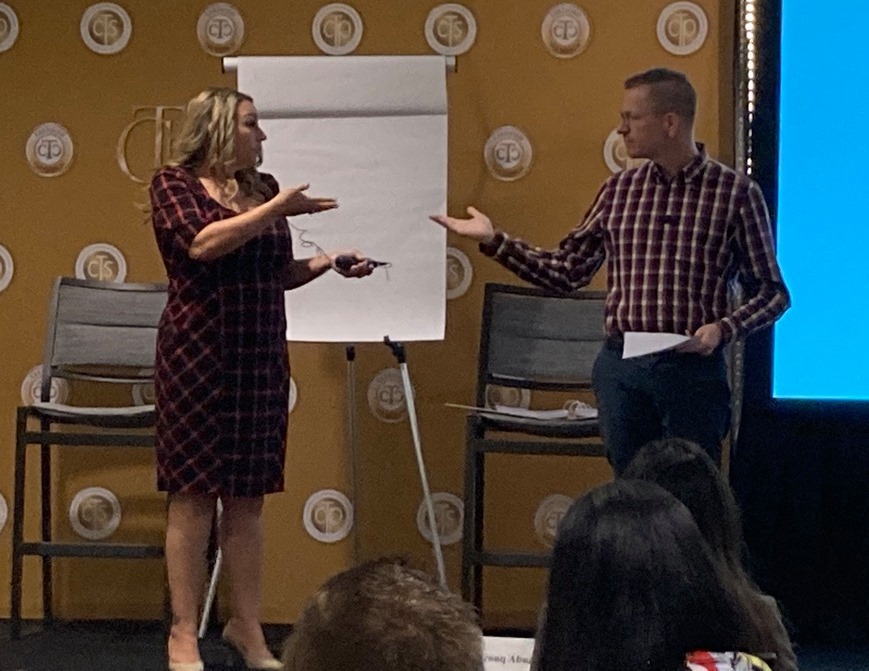Tax Crime Junkies
Tax Crime Junkies
The true crime podcast for people who love taxes, scandals, and stories too outrageous to deduct.
🎉 Over 50,000 downloads and counting!
🏆 Ranked #5 on Feedspot’s “30 Best White Collar Crime Podcasts Worth Listening to in 2025.”
Hey there, Tax Crime Junkies! This is the true crime podcast where taxes meet temptation...and the numbers don’t always add up. Hosted by Dominique Molina, CPA, MST, CTS and Tom Gorczynski, EA, USTCP, CTP we follow the money trail through cases of fraud, embezzlement, tax evasion, and even homicide to uncover the shocking truth hiding behind the spreadsheets.
As tax experts and practitioners, we go beyond the headlines to explain how these crimes happen, why they go undetected for so long, and what ultimately exposes them. From financial schemes gone wrong to greed-fueled cover-ups, we reveal the human motives that turn ordinary people into criminals, and sometimes killers.
We’ve talked to investigators, lawyers, insiders, and even those who’ve served time to bring you gripping stories from the shadowy intersection of finance and crime. Along the way, we show what every taxpayer and business owner should know to stay safe, smart, and out of trouble.
New episodes drop every other week, combining investigative storytelling, expert insight, and unforgettable twists.
Whether you’re a tax professional, a true crime fan, or just fascinated by what people will do for money, Tax Crime Junkies will keep you hooked from the first clue to the final confession. Subscribe wherever you get your podcasts, leave a five-star review, and join us as we follow every trail — all the way to the truth.
Episodes

Tuesday Feb 27, 2024
Tuesday Feb 27, 2024
Episode Summary:
In this gripping episode of "Tax Crime Junkies," hosts Dom and Tom delve into the captivating case of United States v. Frank Kelly, a story that navigates the murky waters of tax law, justice, and the lengths to which individuals will go to contest the might of the IRS. Set against the backdrop of a seemingly innocuous auto repair shop in Pennsylvania, this episode unravels the complex legal battle faced by tax preparer Frank Kelly, charged with conspiracy to defraud the United States.
Key Episode Highlights:
The Beginning: The episode kicks off with the story of an auto repair shop owner embroiled in a tax controversy, setting the stage for Frank Kelly's entrance and the ensuing legal drama.
The Charges: Detailed exploration of the charges against Kelly, providing listeners with a clear understanding of the legal accusations and the implications of a conspiracy charge.
The Undercover Operation: An enthralling recount of how the IRS embarks on a covert mission to probe the practices of Frank Kelly, a tax preparer with a reputation for meticulousness. We set the stage for a gripping tale of suspicion and surveillance.
The Covert Meeting: A detailed analysis of the clandestine encounter between Kelly and an undercover IRS agent. This segment offers listeners an insider's view of the operational tactics used by the IRS and the cautious yet thorough approach Kelly employs in his work.
The Legal Battle: An in-depth analysis of the trial proceedings, from the indictment to the courtroom strategies employed by both the defense and prosecution, shedding light on the intricacies of mounting a defense against federal charges.
Exclusive Interview Preview: Teasing an upcoming episode featuring an exclusive interview with Frank Kelly, offering a unique insight into his personal experiences, the emotional impact of the trial, and his views on the justice system.
Jury Deliberation and Verdict: A look into the crucial role of the jury, emphasizing the weight of their responsibility and the process leading to the unexpected verdict.
What's Next: An exclusive interview with survivor and real tax pro Frank Kelly
Engage with Us:
Feedback and Questions: Have thoughts or questions about this episode? Email us or connect on Twitter @TaxCrimeJunkies
Share Your Story: Inspired by Frank Kelly's story? We're always looking for compelling tax tales to feature in future episodes.
Connect with "Tax Crime Junkies":
Twitter: @TaxCrimeJunkiesPod
Instagram: [@TaxCrimeJunkiesPod]
Special Thanks:
A big thank you to our legal experts for their insights, to Frank Kelly for agreeing to share his story, and, as always, to our listeners for joining us on this journey through the complexities of tax law and the justice system.
Stay tuned for more tales from the world of tax crime, and remember, in the world of numbers and legal battles, there's always a story waiting to be told.

Tuesday Feb 13, 2024
Tuesday Feb 13, 2024
Prepare for another riveting episode of Tax Crime Junkies as we venture into the controversial world of the famed Chrisley family. Unravel their tumultuous journey from celebrity status to courtrooms through our meticulously constructed narrative. Explore the depth of their legal battles, the shocking accusations of embezzlement, fraud, and money laundering, and their surprising resilience amidst hardships.Join hosts Dom and Tom on a deep dive into the intricate network of the Chrisleys' controversies that reveal the importance of tax compliance and the potentially disastrous repercussions of its neglect. Experience the roller-coaster story of this notorious family that continues to claim the media's spotlight.Our episode pulls back the veil on the high-profile case of Todd and Julie Chrisley. As reality TV stars turned prison inmates due to tax evasion, the Chrisleys challenge the legitimacy of the government's case against them, raising serious questions about governmental misconduct and the violation of their Fourth Amendment rights.We take you down the twisting paths of their ongoing legal struggle, shining a light on multiple allegations of false claims made by an IRS officer, improper testimonies, and illegal search warrants. Plus, unravel the role of their CPA, Peter Tarantino, who faced his own separate brush with tax-related convictions.As the Chrisleys continue their relentless pursuit to clear their names and win freedom, this episode will intrigue you with its insightful coverage and question whether these constitutional allegations will alter the final verdict. Tune into this revealing account on the saga of the Chrisleys!

Tuesday Jan 30, 2024
Tuesday Jan 30, 2024
Welcome to the latest episode of Tax Crime Junkies, where we take a deep dive into the infamous South Lane Enterprise scandal. Join this exhilarating journey as hosts Dom and Tom chat with special guest, certified fraud examiner Richard Bailey about the ins and outs of famously exposing a staggering $350 million fraud.
A phone call in the summer of 2013 marked the beginning of the riveting tale woven with greed, fraud, and the spectacular downfall of South Lane Enterprise. Bailey narrates the thrilling saga of uncovering $1.2 million in mysterious funds, signing stock certificates under severe distress, punctuated by a chilling atmosphere of constant danger and threats.
Witness the collapse of a meticulously built empire when the company's insurance sellers start demanding their cut. When co-founder Alexander Chatfield Burns absconds, he leaves behind a chaotic frenzy of legal troubles and a shaken minority partner struggling to salvage what's left.
Despite Burns' attempt to start afresh in Charleston, South Carolina, the Wall Street Journal discovers his past. Striving to escape his past, Burns leaves Bailey grappling with significant personal financial liability and the race to prevent the winery from going under. The episode concludes with Bailey’s dramatic decision to reveal the truth to the authorities, setting in motion the final act of the South Lane odyssey.
In the heart of Pirate Cove, Bailey exposes the fascinating, yet horrifying tale of a 28-year-old’s incredible $350 million Securities Portfolio fraud. Discover the captivating chronicles of duplicity, audacious discoveries, and the severe repercussions in the high-stakes world of finance. Tune in to Tax Crime Junkies as Bailey guides you through the anatomy of this formidable white-collar crime: a plot that will keep you at the edge of your seat until the very end.
You can purchase Richard's exciting new book at amazon: https://www.amazon.com/Pirate-Cove-Insiders-Infamous-Southport/dp/1610886127

Tuesday Jan 16, 2024
Tuesday Jan 16, 2024
Show Notes:
Welcome back to another episode of Tax Crime Junkies! In this thrilling episode, we dive deep into the infamous Southport Lane scandal, a story of financial manipulation, deceit, and a downfall that shook the world of private equity.
Hosts: Dom and Tom
Special Guest: Richard Bailey, Certified Fraud Examiner and author of "Pirate Cove:
An Insider's Account of the Infamous Southport Lane Scandal"
Episode Highlights:
Introduction to Richard Bailey (00:02:00): We introduce our special guest, Richard Bailey, whose expertise as a certified fraud examiner brings unique insights into the Southport Lane scandal.
The Southport Lane Scandal Explained (00:05:00): Richard delves into the intricate details of the scandal, unraveling the complex financial schemes orchestrated by Alexander Chatfield Burns, a young financial prodigy.
Inside the Mind of a Fraudster (00:15:00): A discussion on the psychological aspects driving individuals like Burns to commit such extensive financial crimes.
The Red Flags and Oversight (00:20:00): We explore the missed red flags and the failure of regulatory oversight that allowed the scandal to flourish.
Richard Bailey's Personal Experience (00:30:00): Richard shares his personal experiences and challenges in uncovering and dealing with the ramifications of the scandal, including his interactions with Burns.
Links and Resources:
Richard Bailey's Book: "Pirate Cove: An Insider's Account of the Infamous Southport Lane Scandal"
Contact Information:
Website: TaxCrimeJunkies.com
Twitter and Instagram: @TaxCrimeJunkies
Credits:
Produced by: Vizon
Music by: Vizon
Next Episode Preview: Stay tuned for our next episode where we delve into another gripping tax crime story that will keep you on the edge of your seat!
Thank you for listening to Tax Crime Junkies. Don't forget to leave us a review and subscribe for more episodes. Until next time, stay curious!

Friday Jan 05, 2024
Friday Jan 05, 2024
Tax Crime Junkies: “Delinquent Judges and Juvenile Delinquents” - Part Two
Welcome back to the gripping conclusion of our two-part series on the notorious "Kids for Cash" scandal. Hosts Dominique Molina, a CPA certified tax strategist, and Tom Gorczynski, an enrolled agent and tax instructor, delve deep into the corrupt world of two Pennsylvania judges, Mark Ciavarella and Michael Conahan.
Episode Highlights:
The Kids for Cash Scandal: Unpacking the scandalous activities of Judges Ciavarella and Conahan who exploited their positions to make millions by sentencing first-time juvenile offenders to detention centers for minor infractions, often without fair trials or due process.
Financial Schemes and Cover-ups: The hosts reveal how the judges used LLCs, luxury properties, and dubious rental agreements with Robert Powell, the investor behind the detention centers, to launder their illicit gains.
The Unraveling of a Scheme: The episode details how the FBI and IRS began investigating the judges, leading to a grand jury indictment in 2009 on charges including racketeering, fraud, money laundering, and tax violations.
Impact on Victims: The profound and devastating impact on the lives of the juveniles and their families is highlighted, including the case of Hillary Transue, a teenager wrongfully penalized for a harmless MySpace prank.
Legal Repercussions: The legal downfall of Ciavarella and Conahan is discussed, culminating in substantial prison sentences and restitution payments, while emphasizing the irreversible damage caused to countless young lives.
Advocacy and Reform: The episode acknowledges the efforts of victims like Hillary Transue in advocating for juvenile justice reform.
Resources for Listeners: For those interested in learning more, the hosts recommend the book “Kids for Cash” by William Ecenbarger and the 2013 documentary directed by Robert May.
Closing Thoughts:
In this compelling and heart-wrenching episode, "Tax Crime Junkies" not only exposes the depths of judicial corruption but also sheds light on the far-reaching consequences of such heinous acts. The hosts remind us of the importance of bringing such cruel injustices to light and advocate for continued vigilance and reform in the juvenile justice system.
Stay Connected: Don’t forget to subscribe for more intriguing stories and leave a five-star review. Share with friends and join us again as we unravel more complex tax crime mysteries.
“Every crime has a trail that leads to the truth.” - Dom and Tom, Tax Crime Junkies

Wednesday Dec 20, 2023
Wednesday Dec 20, 2023
Episode Title: Kids for Cash: The Dark Side of Juvenile Justice
Episode Summary: In this riveting two-part episode of "Tax Crime Junkies," hosts Dominique Molina and Tom Gorczynski delve into the infamous Kids for Cash scandal. This series uncovers the shocking exploitation of the juvenile justice system by two Pennsylvania judges, Mark Ciavarella and Michael Conahan, who used their positions for personal financial gain. The episode unfolds a tale of corruption, greed, and the devastating impact on the lives of young offenders.
Key Highlights:
The Startling Case of Matthew:
The episode opens with the story of 13-year-old Matthew from Luzerne County, Pennsylvania, who is detained for throwing a piece of beef during a domestic dispute.
Judge Mark Ciavarella, known for his tough stance on juvenile crime, delivers a harsh and disproportionate sentence to Matthew, sending him to a private juvenile facility.
The Rise of Judge Ciavarella and Conahan:
Ciavarella's 1995 campaign, based on tough-on-crime rhetoric, leads to his election as a judge.
He shares a personal anecdote highlighting his belief in harsh discipline, shaping his judicial philosophy.
Development of PA Child Care:
Ciavarella and Conahan play key roles in the establishment of PA Child Care, a private juvenile facility, with local attorney Robert Powell and builder Robert Mericle.
This development marks the beginning of their corrupt practices.
Illegal Kickbacks and Ethical Breaches:
The judges receive nearly a million dollars in finder's fees from Mericle, a glaring violation of judicial ethics and legal standards.
They manipulate the system to ensure PA Child Care's use and profitability, guaranteeing their financial benefit.
Zero Tolerance and Injustice:
Ciavarella extends his zero-tolerance policy, resulting in excessive sentences for minors committing minor offenses, thereby filling PA Child Care.
The judges conceal their illicit earnings, failing to report them on financial statements, in a stark display of hypocrisy and corruption.
Tragic Stories of Young Lives Altered:
Numerous cases are highlighted where minors are unfairly sentenced for trivial misdeeds, profoundly impacting their lives and their families'.
Parents and communities are left bewildered and distressed by the injustice meted out in Ciavarella's courtroom.
The Downfall Begins:
Part Two teases the emergence of a determined mother seeking justice, which plays a crucial role in exposing Ciavarella and Conahan's corruption.
The next episode promises to explore the dramatic unraveling of the judges' corrupt scheme and the consequential trial.
Closing Thoughts: The hosts express gratitude to the listeners and encourage them to tune in for the next episode, promising further insights into the scandal's resolution. They emphasize the importance of awareness and accountability in the justice system.
Join us next week for the continuation of this harrowing story in "Kids for Cash: The Dark Side of Juvenile Justice. Part 2" Subscribe, share, and stay tuned for more episodes where the truth behind each crime is painstakingly uncovered.

Tuesday Dec 05, 2023
Tuesday Dec 05, 2023
Episode Summary:
In this gripping episode of "Tax Crime Junkies," we are joined by Anna Mace, a former IRS Revenue Officer and author of "Tax Me If You Can: Tax Cheats, Government Waste, and the Shooter." Anna's 15-year tenure at the IRS, filled with intense experiences and critical insights, shapes a fascinating discussion about the complexities of tax collection, government bureaucracy, and taxpayer interactions.
Key Highlights:
Anna's IRS Journey:Anna shares her journey as a Revenue Officer, revealing the unanticipated dangers and emotional challenges of the role. She discusses a harrowing incident where she witnessed a taxpayer's suicide, a profound experience that impacted her both personally and professionally.
Challenges in the IRS:Anna delves into the difficulties she faced within the IRS system, including the lack of support for mental health and the stress-inducing environment. She talks about her decision to excel despite these challenges and her expertise in complex tax issues.
Dangerous Encounters:The episode covers the Randy Novak case, illustrating the severe risks IRS officers face from taxpayers driven by intense hatred toward the government. Anna emphasizes that this hatred often extends beyond the tax system and is directed at anyone representing the government.
Transition to an Enrolled Agent:Post-retirement, Anna became an enrolled agent, switching sides to represent taxpayers. This shift offered her a unique perspective on the IRS's operational inefficiencies and the emotional toll of tax problems on individuals.
Writing 'Tax Me If You Can':Anna recounts the challenges she faced in publishing her book, from navigating IRS protocols to rewriting her manuscript to comply with privacy concerns. Her struggle underscores the bureaucratic inefficiencies within the IRS.
Advocacy for Change:The podcast explores Anna's suggestions for improving IRS services, including enhancing the quality of customer service and eliminating unannounced house calls by revenue officers.
Conclusion:
Anna Mace's insights provide a rare glimpse into the inner workings of the IRS, the emotional burden of tax collection, and the bureaucratic hurdles that both taxpayers and IRS employees face. Her story is a compelling call for empathy, efficiency, and systemic change within the tax collection system.

Tuesday Nov 21, 2023
Tuesday Nov 21, 2023
Episode Summary: In this gripping episode of "Tax Crime Junkies," hosts Dominique and Tom delve into a true crime story that intertwines tax evasion with a murder-for-hire plot. The episode focuses on Randy Nowak, a Florida-based carpentry contractor and antique car enthusiast, who finds himself in hot water with the IRS. When faced with an audit and the discovery of his hidden offshore millions, Randy panics and spirals down a dark path.
Key Highlights:
The American Dream Turned Nightmare:
Randy Nowak, a family man and business owner, faces an IRS audit.
His failure to file certain forms and pay payroll taxes leads to severe penalties and potential jail time.
A major twist reveals Randy's millions hidden in an offshore account.
A Desperate Plan:
Randy seeks help from his business associate, Walter McGhee, rumored to have connections with the Outlaws motorcycle gang.
Believing his situation to be dire, Randy contemplates hiring a hitman to eliminate his IRS auditor, Christine Brandt.
Undercover Operations and the Hitman “Reaper”:
Walter, alarmed by Randy's proposition, cooperates with authorities, leading to an undercover investigation.
An FBI agent, posing as hitman "Reaper," engages with Randy, who provides detailed information for the planned assassination.
The Downfall:
Randy's plot unravels as he's arrested while attempting to pay the second installment to "Reaper."
At trial, Randy's defense crumbles, revealing a lack of remorse and a focus on his financial losses over the gravity of his actions.
A Tragic End:
Randy is convicted and sentenced to 30 years in prison, where he maintains his innocence until his death.
Closing Thoughts: Dominique and Tom reflect on the absurdity and dangers of attempting to evade the law, especially when it involves federal agencies like the IRS. They emphasize the importance of ethical conduct and the severe consequences of letting greed cloud judgment.
Next Episode Tease: Join us next week as we interview a former IRS collections officer who knew Christine Brandt the target of Randy Nowak's murder plot.

Wednesday Nov 08, 2023
Wednesday Nov 08, 2023
Show Notes:
Hosts Dominique and Tom introduce the episode's theme, focusing on a sophisticated scam targeting homeowners.
The hosts discuss the allure of easy money:, describing how the scam preyed on new homeowners with the promise of a secret escrow account leading to large tax refunds.
Unpacking the Scam:
The mechanics of the scam are explained, highlighting how the fraudulent scheme involved amending tax returns and fabricating financial documents.
The Players:
Introduction of the key figures behind the scam: Iran Backstrom, Arthur Daniels (aliases Shariyf Noble and Mehef Bey), Aaron Aqueron, and Yomari Febres.
The Scheme in Action:
Detailed breakdown of how the scam was executed, including the preparation of false tax forms and the illicit recruitment of clients.
Victims and Windfalls:
Discussion of the impact on victims who received large refunds, and the subsequent challenges they faced when the IRS began investigations.
Legal Repercussions:
Exploration of the legal fallout for the scammers, including indictments and convictions.
Closing Thoughts:
The hosts reflect on the importance of skepticism in financial matters and the dangers of too-good-to-be-true schemes.
Final Advice:
Reminder to listeners to always consult with reputable professionals in financial and tax matters.
A sneak peek at next week's episode, continuing the journey into the world of tax crimes and financial fraud.
Credits:
Hosts: Dominique Molina and Tom Gorczynski
Music: Vizon
Remember to subscribe for more episodes and share with friends who might find this topic intriguing!

Thursday Oct 19, 2023
Thursday Oct 19, 2023
Show Notes: Tax Crime Junkies Episode - "The Vegan Vixen and the Vegas Vanishing Act" (Part 2 - Continuation)
In the thrilling conclusion of our episode on Sarma Melngailis, we delve even deeper into the shocking aftermath of her fall from grace and the complex web of deceit spun by her husband, Anthony Strangis.
The Legal Consequences:
Sarma and Anthony faced serious charges, including grand larceny, tax fraud, and labor violations, with a potential prison sentence of up to 15 years if convicted.
Sarma was offered a plea deal that would entail up to three years in prison if she pleaded guilty to the top charge of second-degree grand larceny.
Anthony Strangis received a one to three-year prison sentence but was released after serving a year and three days. He was ordered to pay back the funds to investors and serve five years of probation.
A Troubled Relationship:
During Sarma's trial, it was revealed that she had an affair with her high-profile defense attorney, Jeffrey Lichtman, who previously represented El Chapo.
The affair spanned from February 2017 to May 2018, and X-rated messages exchanged during this time were later acquired by the New York Post.
Sarma's Path to Redemption:
Sarma Melngailis eventually pleaded guilty to grand larceny, tax fraud, and conspiring to defraud, admitting to stealing $1 million from her shuttered restaurant, Pure Food and Wine.
She received five years of probation following four months of incarceration on Rikers Island.
Sarma has been diligently working to pay off her debts, including using the earnings from selling the rights to her story in the Netflix documentary "Bad Vegan" to pay her former employees.
A Glimpse into Sarma's Life Today:
Sarma filed for divorce from Anthony Strangis in May 2018 and launched a personal website, "Sarma Raw," where she shares her story.
As of January 2019, she was living in Harlem with her dog Leon, enjoying a quieter life.
She expressed her desire to reopen her vegan restaurant if given the opportunity, as she still believes New York would welcome her back.
Sarma's Comeback Attempt:
In a surprising twist, Sarma is reportedly making a sensational comeback attempt by trying to reopen her former restaurant, Pure Food and Wine.
She has been considering various ways to repair the damage caused by her past actions and debts.
Conclusion:
Sarma's story is one of redemption, resilience, and the pursuit of a second chance in the culinary world.
We invite you to share your thoughts on Sarma's journey and whether you believe she should make a comeback. Let us know in the comments.
Join us again next week as we continue our mission to uncover the loopholes and close them for good in the world of tax crime. Remember, every crime leaves a trail that leads to the truth!
Audio Credit: Bad Vegan, Netflix

Meet the Tax Crime Junkies!
Dominique Molina is a CPA, speaker and teacher, leader of the American Institute of Certified Tax Planners, has a law degree and a real interest in true crime.
Tom Gorczynski is an EA, speaker and teacher, and admitted to practice in Federal Tax Court (USTCP). One might say Tom has an amateur education in avoiding murder from his love of true crime.
We decided to combine our love of tax and crime to bring you stories of greed, envy, and just plain stupidity in the creation of Tax Crime Junkies. Join us each week as we bring you more tales of white collar crime and the loopholes that went left.








